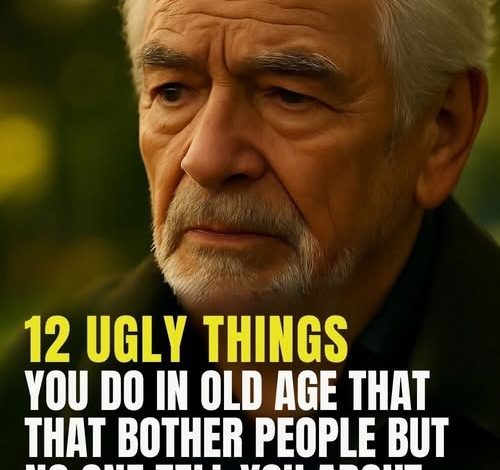
12 Habits That Quietly Create Distance As We Age, And How to Transform Them Into Connection and Confidence
As we grow older, life offers us a new kind of wisdom—one that isn’t rushed, but earned. It emerges from years of lived experiences, of heartache and joy, of lessons gathered quietly in the background of daily routines. Aging brings clarity and perspective, but it can also usher in subtle habits that, without our noticing, start to distance us from the world and from those we care about most. These habits aren’t failings—they’re just familiar patterns we grow comfortable with.
Yet with awareness and intention, we can gently shift them to create deeper connection, lasting confidence, and renewed purpose in our relationships.
Consider something as simple as personal grooming. As responsibilities shift and priorities change, it might feel unnecessary to fuss over clothes or hairstyles. But taking the time to care for how we present ourselves—wearing something fresh, styling our hair, putting on a splash of fragrance—sends a message to both ourselves and the people around us. It says, “I still care. I am still here.” It’s not about vanity; it’s about honoring our presence and inviting others to see and engage with us fully. Even small acts, like updating your wardrobe one piece at a time or treating yourself to a haircut you’ve been putting off, can uplift your spirit and reawaken joy that ripples outward.
Another habit that subtly builds distance is unfiltered honesty. As we age, we often feel free to speak more openly, unbothered by social expectations. And while honesty is a valuable trait, it must be coupled with empathy. Words matter. Before we share a criticism or offer advice, it’s worth pausing to ask: “Will this help? Or might it wound?” When spoken with care and thoughtfulness, honesty can nurture rather than divide, deepening trust and encouraging mutual respect.
Listenin, too, is a powerful connector—and it’s often overlooked. Sharing our stories is important, but equally vital is making space for others to share theirs. Ask questions. Be genuinely curious. You might find that a reserved grandchild opens up about something meaningful, or a neighbor reveals a hobby that leads to friendship. In conversation, real connection happens not in speaking, but in the give-and-take of being heard and hearing.
Generational differences can also quietly widen gaps. Joking about “how things used to be” or brushing off younger people’s interests can create barriers that silence rather than invite. Instead, meet the next generation with curiosity. Ask them what they care about, what music they love, what technology excites them. Let their enthusiasm inspire you. You may discover shared passions or simply enjoy their fresh perspective—and they’ll feel seen and valued by you in return.
Another common habit is letting conversations revolve entirely around health. It’s normal—and often necessary—to talk about medical concerns with close ones. But when it becomes the only topic, it can overshadow the richness of other experiences. Try to weave in lighter, life-affirming stories. Share a small triumph, a funny mishap at the store, or a memory that made you laugh. These moments create balance, reminding everyone that there’s more to you than your latest doctor’s visit.
Some habits, like clinging to outdated opinions, making offhand jokes that no longer land well, or holding rigidly to “the way things should be,” can unintentionally isolate us. The world is always evolving, and staying open—listening, learning, and adapting—shows others that you’re still growing, still engaged, and willing to change. It doesn’t mean abandoning your beliefs; it means making room for empathy and understanding.
Maintaining independence also plays a vital role in preserving self-worth. Accepting help is wise and necessary at times, but holding on to the daily tasks you can still do—like watering plants, making lunch, sorting mail—keeps you grounded and self-reliant. These small actions quietly affirm your capability, reminding others, and more importantly yourself, that you are still actively contributing.
Aging with intention isn’t about fading into the background or giving up influence. It’s about leaning into life with curiosity, compassion, and clarity. Every small choice you make—whether it’s dressing with care, listening with attention, or choosing kindness over critique—becomes a gesture of connection. These moments build bridges. They soften walls. They remind those around you that you’re not just growing older—you’re still living.
Imagine waking up each day and asking: who can I brighten today? What new thing can I discover? Who needs to be heard? These questions open pathways to purpose. And the answers, often small and unremarkable on the surface, accumulate into a legacy of love, wisdom, and presence that far outlasts the years themselves.
So no matter your age, no matter the season of life you’re in, the opportunity to deepen your connections—to your family, to your community, and to yourself—is always within reach. Growth doesn’t end with youth. In fact, it might just be beginning. And in choosing to grow with grace and intention, you show everyone around you that aging is not about losing relevance, but about expanding into the fullest, kindest, and most connected version of who you’ve always been.




